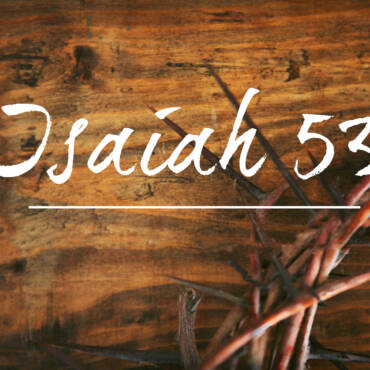Thankful for His Providence

By Sam Nadler
Thanksgiving Day gives us an opportunity to reflect on God’s grace and the harvest He provides. God orders the seasons. He alone supplies the early and the latter rains that are crucial for a bountiful harvest. In a similar way, He orders the seasons of our lives. Timing is everything.
Harvest Calendar
The Gezer Calendar sets forth the gravest seasons in ancient Israel. Olives were harvested from the middle of September to the middle of November. Flax was harvested in March-April by cutting it off at the ground, then allowing the stalks to be softened (called retting) by dew or other moisture (Jos. 2:6). In April or early May, the barley harvest took place, with the wheat harvest in May-June. The harvesting of figs, grapes, pomegranates, and summer fruits were during August and September.
Time to Glean God’s Grace
When I think of the harvest, I also think of the labor. In Ruth 2:2, we read, “And Ruth, the Moabitess, said to Naomi, “Please let me go to the field and glean among the ears of grain after one in whose sight I may find favor.” We can learn a few lessons from Ruth. First, we see Ruth’s willingness to work when she said “let me glean grain.”
Gleaning grain meant bending and picking up loose grains that were accidentally overlooked by the reapers. It was a humble way to acquire something to eat and, at times, may have seemed like taking other people’s leftovers from their trash. This was also how the manna was collected in Exodus 16, as people bent over to pick it up off the ground. Therefore, we learn from Ruth, how to labor in humility.
Provision For The Poor
In Torah, Israel is warned not to reap the corners of their fields or gather the gleanings of the harvest; the gleanings were to be left for “the poor and the resident alien” (Lev. 19:9-10, 23:22; Deut.24:19-22). Ruth fit both categories. Deut. 24:19-22 gives a bit more insight into gleaning. The unharvested sheaf of grain was to be left for the needy, so that the Lord’s blessing would rest on the owner’s work. In the olive harvest, the trees were only to be beaten once with rods to gather the olives. The olives that were left behind were for the widow, the orphan, and the alien. During the grape harvest, the vines were gone over only once so that the needy could have the remainder. This generosity allowed the needy to collect all that was not initially harvested.
Compassion Provided
This was the compassion that God’s law required; a benevolence that allowed the poor and alien to work by gleaning. There were no free handouts for the healthy and able bodied people. The benevolence provided work so that they might eat, although often just barely.
A miserable day’s work netted only the little grain that the reapers could reach, gleaning under the hot Middle Eastern sun.
Israel was told to consider the poor so that they would remember that they had been redeemed from Egypt (Deut. 24:22). Now, we learn how Ruth trusted in God’s providential care. In Ruth 2:3 we read, “So she departed and went and gleaned in the field after the reapers; and she happened to come to the portion of the field belonging to Boaz, who was of the family of Elimelech.”
When Ruth happens to choose one field among the many possible fields to glean, it alludes to the sovereignty of God over events in the lives of individuals.
Likewise, as we trust God through the ordinary and distressing problems of our lives, we will also see His providence at work. For example, William Carey proposed to go to the South Seas but was divinely guided to India, where he translated the Bible into over forty languages found in that country.
David Livingstone planned to go to China, but God led him to Africa as a missionary and explorer. There he brought the blessings of salvation in Messiah to the lives of thousands. God providentially leads those who faithfully seek His grace. This grace is sometimes seen only through the eyes of faith.
God’s Sovereignty Provides Stability
Providentially, grace prepares the way even before we start seeking faith in Messiah. As soon as we, by faith, seek grace and find it, we can walk in the good works that were prepared beforehand for us. Your life in Him depends on the fact of God’s providence because “we are His workmanship, created in Messiah Yeshua for good works, which God prepared beforehand, that we should walk in them” (Ephesians 2:10).
The Scriptures assume God’s oversight of our lives through His providence. We read in Psalm 37:23, “The steps of a man are established by the LORD.” His overseeing providence in our lives provides us much needed stability. As 1 Thessalonians 5:24 affirms us that “Faithful is He who calls you, and He also will bring it to pass.” Because He oversees our lives, we can be confident in Him.
God’s Providence Comes Through Faith
We can see His providence at work: when Ruth was looking for a job that provided only daily nourishment, God gave her much more than that. He gave her an eternal inheritance, and a lasting legacy. Matthew 1:5 confirms that the Messiah of Israel and the Savior of the world descended from the ancestors of Ruth and Boaz. The providence of God is appropriated through our faith in Messiah, and our undivided trust that He will guide us even in our mundane activities for His eternal purposes. We can faithfully work to feed our family, raise the kids, go to school – God is at work in and through us.
As we anticipate Thanksgiving Day, let us remember His providence in our lives, and appreciate the fields where He providentially placed us. May we, like Ruth, have humility of heart and willingness to labor in order to bring Him glory and demonstrate His grace to all in need of Him. (Adapted from the book of Ruth, Hope Fulfilled in the Redeemer’s Grace).



